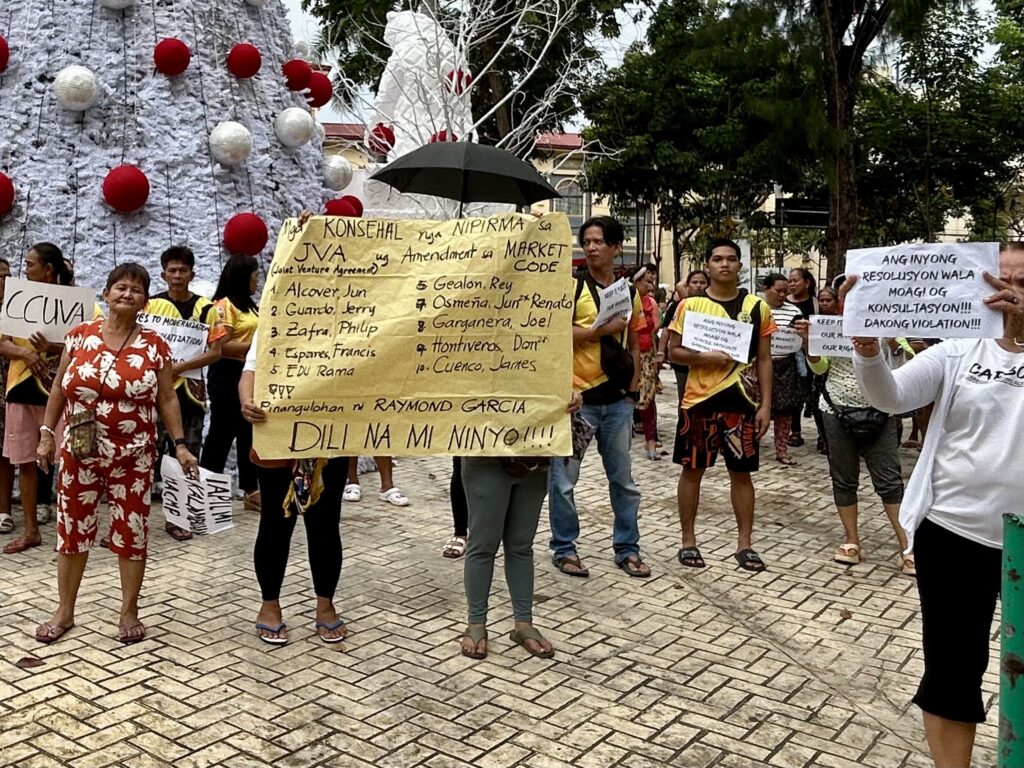
Several vendors in Cebu City gathered at Plaza Sugbo on Wednesday, December 11, to protest the reclassification of a portion of the Carbon Market. | CDN Photo/ Pia Piquero
CEBU CITY, Philippines – The reclassification of a portion of the Carbon Public Market, particularly the hawker center area, from institutional to commercial zoning could bring high income to Cebu City, according to a local legislator.
However, vendors argue it compromises transparency and threatens their livelihoods.
Councilor Jerry Guardo, chairman of the infrastructure committee, clarified that the Carbon Market reclassification from institutional to commercial zoning is a necessary step for Megawide Construction Corporation to operate its business legally.
READ:
Carbon market vendors: P20 daily to help fund market improvements
Carbon Market plans to go ‘zero-waste’
Cebu City collects higher market revenue from Jan-April 2024
In an interview on Wednesday, December 11, Guardo explained that the zoning reclassification applies only to the Warwick Barracks area, which is currently classified as institutional due to its proximity to a university.
“Ang application sa Megawide sa Carbon development, [kay] currently classified siya as institutional… i-reclassify lang siya into commercial,” Guardo said.
He said that without the reclassification, the company would not be able to obtain the necessary permits to conduct business operations in the area, as required by city ordinance.
“Requirement sa zoning [ang reclassification] for them to operate sa business. Dili ma-approve ang construction, dili ma-issuehan og business permit, [so] they cannot really engage in the business,” he added.
Guardo, however, assured vendors and the public that the reclassification would not affect the current rental rates in the market, as these were already set and agreed upon in the Joint Venture Agreement (JVA) between Megawide and the city.
“[The rates and rental fees were] tackled already a long time ago… Naa na nay agreement, naa na nay taripa. It will not affect the current rental,” Guardo said.
He also pointed out that other areas in the Carbon Market, such as the wet market and the interim market are already classified as commercial. The reclassification of Warwick Barracks aligns its zoning with the rest of the market.
“[Ang] existing… if you look at the wet market, the interim, and prutsan, they are all classified as commercial. Ang kana lang na portion [ang Barracks] kay institutional. I-reclassify lang siya but it does not in any way affect the prices of commodities,” Guardo explained.
He added that the reclassification would benefit Cebu City through increased revenue from real property taxes, which Megawide will pay.
“[The] advantage ana [is] mudako ang income sa City, but the one paying sa real property taxes kay ang Megawide,” Guardo said.
The councilor also stressed that reclassification is standard procedure for businesses transitioning operations from institutional to commercial zones and was approved by the city council as part of the city’s compliance with existing zoning ordinances.
Despite these assurances, vendors expressed distrust and frustration. They claimed a lack of consultation and raised concerns about commercialization’s potential impacts on their income.
In a position paper dated December 11, several vendor associations, including the Cebu Coalition of United Vendors Association (CCUVA) and Carbonhanong Alyansa, petitioned the city council to recall the resolution approving the reclassification.
The vendors, united under the CCUVA, CEMVEDCO (Cebu Market Vendors Multipurpose Cooperative), Carbonhanong Alyansa, and Unit 3 Stallholders Association, expressed their deep concern over the commercialization and reclassification of the land in their market.
They fear that these changes will marginalize small vendors in favor of large corporations, ultimately leading to the demise of Carbon as a public market.
During the November 28, 2024, executive session called by Councilor Nestor Archival, several alarming issues were uncovered.
READ:
NBI asked to check middlemen’s role in manipulating food prices
The vendors pointed out that no public hearing was conducted prior to the approval of Megawide’s Variance Application, a claim that contradicts the Zoning Board’s assertions in Resolutions 24-074 and 24-075.
They also revealed anomalies in the Barangay Clearance cited in the resolutions, stating it was not deliberated by the Barangay Council nor passed through a Barangay Resolution, as confirmed by Hon. Barangay Ermita Councilor Vivian Ando.
Furthermore, the City Planning and Development Office (CPDO) has yet to issue a locational clearance to Megawide, according to Architect Anna Ruby King of the CPDO.
The vendors highlighted that a pending court case seeks to declare the Joint Venture Agreement (JVA) between the City and Megawide Construction Corporation illegal, which adds further complexity to the legality of the Variance Application.
Additionally, the vendors criticized the outdated Zoning Ordinance, which dates back to 1996 and has not been updated for 28 years, making it incompatible with current urban development needs.
The vendors lamented the rush approval of the Zoning Board resolutions and Megawide’s Variance Application by the City Council, arguing that the council failed to address critical issues such as the lack of public hearings, the legitimacy of the Barangay Clearance, and the absence of locational clearance.
They warned that the commercialization of Carbon’s land use would result in increased rents and fees, as evidenced by “The Barracks” (Hawker Center) built by Megawide-C2W, where stall rentals cost up to P40,000 per month. This would lead to higher prices for agricultural products, eroding Carbon’s reputation as an affordable market and its role as a “food security hub” for the Visayas and Mindanao.
The vendors fear the eventual loss of the cultural significance of the phrase “mangarbon ta.”
In their petition, the vendors called on the City Council to revoke the resolution and halt all construction activities by Megawide at Warwick Barracks, and retain the institutional classification of Carbon’s land.